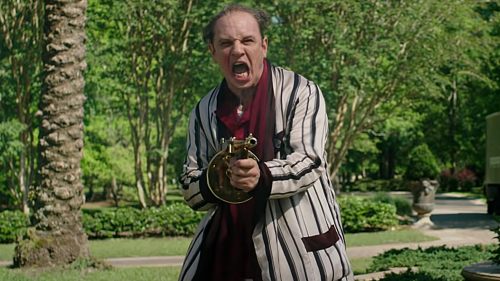GLASS Review: We’re Gonna Be Arguing About This Goddamn Movie For Years
Warning: this post contains minor Glass spoilers.
There's a scene early in the third act of M. Night Shyamalan's Glass where you can actually feel the movie come off the rails. Up until that point it's been somewhat uneven, chatty and maybe a little dour - the kinda thing some people might call "deliberately-paced". But then this particular moment happens, and suddenly everything goes haywire: the goofy undertones suddenly become goofy overtones, the script piles one twist on top of another, there's an incongruously hopeful beat, and then the film's title smashes onscreen for the second and final time.
The audience I saw Glass with seemed somewhat gobsmacked by what they'd just witnessed, unsure how to proceed. It wasn't that the twists were extra clever, or that the film hadn't mostly done what its ad campaign promised it would do. No, this was a group of people who seemed legitimately unsure whether they enjoyed what they'd just seen. It reminded me of the audience reaction to Ridley Scott's Alien: Covenant, another highly-anticipated genre entry filled with weirdo curveballs and (ostensibly) Big Ideas.
And as was the case with that film, I suspect most people will ultimately reject Glass. This is not the crowdpleaser so many people wanted (I'd argue that it repeatedly goes out of its way to avoid becoming that crowdpleaser), and its knowingly ridiculous flourishes will register as simply ridiculous to almost everyone. Of course Shyamalan's films have always been on a very particular, very narrow wavelength, but this one's up there with Lady in The Water and The Happening in terms of aggressively committing to the bit, and you know how people felt about those movies.
That's right, Shyamalan apologists: it's time to mount up. If you thought we were in the shit before, whoa buddy, just wait until you see what the trenches look like this time. It's gonna be a motherfucking bloodbath out there.
Fittingly, Glass feels like three personalities at war with one another. The first comprises the opening 45 minutes or so, a period in which all of the characters are reintroduced and positioned around the board. We find out that David Dunn (Bruce Willis) is now running a home security store with his son (Spencer Treat Clark). Kevin Wendell Crumb (James McAvoy) is back at it again with the kidnapping hijinks, terrorizing a quartet of cheerleaders in an abandoned warehouse and waiting for his most violent personality, The Beast, to show up and eat everyone. Mr. Glass (Samuel L. Jackson) is not-so-safely tucked away in the local mental institution, an apparently harmless threat until Dunn and Crumb get captured and find themselves living up the hallway from him. They're all to be overseen by Dr. Ellie Staple (Sarah Paulson), who specializes in patients who believe themselves to be superheroes.
During this stretch, Glass is sleek, exciting and pretty much exactly the movie we all pictured in the wake of Split's surprise ending. Then a mood swing occurs, and suddenly Glass is a movie about people trading exposition in claustrophobic little rooms. This section of the film also runs about 45 minutes, but manages to feel twice as long thanks to the fact that so much of it is just talking, talking, talking. It's never quite boring, mind you, but it also feels like a pronounced downshift from the relative excitement of that opening act. It's here that Glass will lose most of its audience, the vast majority of which has spent the years since Unbreakable being conditioned to expect non-stop thrills from their superhero movies. Instead they'll find McAvoy trying on nearly two dozen personas, Willis glowering, and Jackson mostly just sitting catatonic in a wheelchair.
Then comes the final half hour, where a number of things we mustn't discuss occur. If the audience's patience was already frayed, it will likely be eroded completely by the absolutely banana-pants twists and turns that occur during this stretch of the film. The dialogue, which had previously been a little heavy-handed with the superhero talk, becomes flat-out patronizing in its mission to explain comic books (the "showdown" moment matches Gotti's "five boroughs" scene in terms of sheer, thudding obviousness). The performances become either cartoonish or stilted. For what feels like fifteen straight minutes, Glass throws one twist after another at its audience, some more ill-advised than others, and then it ends, in a way I can't imagine anyone - even this film's most ardent supporters - describing as "satisfying".
And yet, for all of this, I did not hate Glass. I was, in fact, completely onboard with it until the third act, where I found myself pulverized by one questionable decision after another. I'll need to see it again before I know where I've landed on that final half hour, but my initial reaction is a sort of astonished and begrudging respect. This absolutely isn't the movie (or the ending!) I wanted, but I truly admire how disinterested the movie was in making me happy. How easy it would have been to give everyone what they were clamoring for! How safe! The version of Glass most people would enjoy would involve seeing Mr. Glass' diabolical plan play out just as it's initially described in the film; instead, things mostly unfold in and around a nondescript parking lot.
That choice seems absurd on the surface, but it's emblematic of the film in general, and a choice I believe was made deliberately. I appreciated the audacity of that decision, just as I appreciated how over the top McAvoy's performance was, or the silliness of Glass' scheme, or the lengths Shyamalan goes to in order to explain the dueling cameos he played in both Split and Unbreakable. Unlike The Happening, where M. Night attempted to revise his own history by later claiming that he intended to make a bad B-movie (sure, Jan), I believe Glass to be a film whose goofiest decisions were intentional. For better or for worse, this is Shyamalan fully delivering on the "grounded superhero" set-up established by Unbreakable. A fair amount of it simply doesn't work, but even when it's stalling out (one reveal is handled so poorly, you could practically hear the air being sucked out of the theater when it happened) I found it fascinating to watch, even as I could sense the viewers around me recoiling with the realization that Glass would not be serving up the spectacle they wanted.
I wonder about those folks, the ones who expected a big, tentpole-style finale to this trilogy. There's absolutely nothing in either Unbreakable or Split to suggest such spectacle might occur, but there's zero doubt in my mind that huge portions of this film's paying audience will be disappointed when things don't shake out that way. I name-dropped Alien: Covenant earlier, and the more I think about it, the more that film seems like an appropriate touchstone here, in the sense that Glass is a film that'll please very few people, but the few who do find something to enjoy in it are likely to be fanatical. As a card-carrying M. Night Shyamalan apologist, I will gladly stand amongst their ranks. Lord knows I've done it before.



